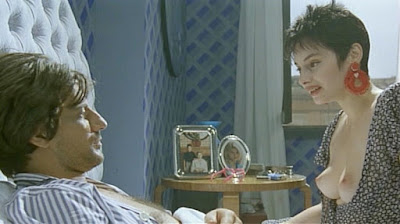The Voyeur (L'uomo che guarda) is a 1994 Tinto Brass movie based (loosely) on Alberto Moravia's novel.
Tinto Brass has had a fascinating career. In the 60s he was being hailed as the next Antonioni. His art-movie credentials were impeccable. Then in 1976 he made Salon Kitty and all hell broke loose. It dealt with a subject that obsessed Brass at the time - the links between absolute power and sexual excess. It was not a movie for the faint-hearted. He followed it up with Caligula which ignited an even bigger firestorm.
After which Brass more or less decided to go his own way. He’d make the movies he wanted to make and if the critics hated them then that was their problem. And the movies Brass wanted to make were erotic movies. Intelligent, sophisticated, witty, arty erotic movies.
The 70s had been the heyday of art porn, a period when it really did seem possible (to a lot of people) to make erotic art movies. Some put the emphasis more on art than eroticism and some focused more on the eroticism. The results were mixed but some genuinely extremely good and interesting movies were made. By the 80s the advent of home video and hardcore killed the softcore movie market stone dead. What Brass wanted to do was simply no longer possible. He did it anyway. And made a successful new career out of it.
Tinto Brass made arty erotic movies but do not make the mistake of thinking that these movies are going to be dull, earnest and miserable (as is usually the case when British or American directors try to do arty erotica). Most of Brass’s erotic films contain a great deal of humour and quite a few are in fact arty sophisticated sex comedies. Brass is famous for his love of the female posterior but there’s a lot more to him than that. He has a playful sense of humour. He has the crazy idea that sexuality is a good thing and that sex can be enjoyable. It can also be amusing.
Which brings us to The Voyeur. Eduardo (Dodò to his friends) is a professor of French literature. He is married to Silvia (Katarina Vasilissa). They live with his bedridden father who is also a professor. He is bedridden due to an accident but is expected to recover. Silvia has moved out but she still sleeps with Dodò. She seems strangely distant emotionally. Dodò thinks she may be having an affair.
Dodò is a voyeur, in a sense. It is partly a sexual kink with him but it’s also a professional interest. The main focus of his academic work is voyeurism in art and literature, but voyeurism in a wider sense than the purely erotic. To Dodò the pleasure of observing is one of the keys, perhaps the principal key, to an understanding of art and literature.
He met his wife through his interest in voyeurism - he used to spy on her through her open window. Then he found out that she knew he was watching and it excited her. Silvia is an exhibitionist so they’re well-matched.
Dodò begins to suspect that Silvia is having an affair with his father. His father is certainly very interested in sex, and he receives certain sexual favours from his pretty nurse Fausta (Cristina Garavaglia). Dodò has watched them together.
Dodò becomes increasingly obsessed. He is insanely jealous. He has to find out what is really going on even if it leads to disaster.
This is a movie about voyeurism but it’s also a movie about secrets, and lies, and fantasies. Some of the secret things may be merely fantasies. Some of the lies may not be lies. And when we observe things we can’t always be sure that they’re true, and if they are true we can’t always be sure what they mean. Fantasies can be difficult to distinguish from reality. Dodò may in fact be living in a world of his own fantasies. On the other hand it might all be true.
So there’s lots of artiness here. There is also a staggering amount of both male and female frontal nudity. And lots of quite graphic sex. It goes as far as it’s possible to go while remaining softcore, and then a little bit further. Not surprisingly it did not get a U.S. theatrical release.
Tinto Brass himself has never made any secret of his voyeuristic obsession with the female form so this is a voyeuristic movie about voyeurism made by a voyeur and watching the movie is an exercise in voyeurism, all of which is exactly what Brass intended it to be.
Brass’s later movies tended to be shunned by critics who refused to consider the possibility that such very sexually explicit movies might be intelligent and emotionally nuanced. They also failed to understand that Brass was deliberately provoking them. In addition they could not possibly grasp the idea that erotica might be done with humour.
The Voyeur is a genuine attempt to grapple with subject matter that other directors with his early art-house credentials would never dare to confront. It’s intriguing and it’s highly recommended.
This is one of three films included in the UK Fifty Shades of Tinto Brass DVD set. The Voyeur has since been released on Blu-Ray by Cult Epics.
I’ve also reviewed Brass’s excellent Monella (1998) as well as Tra(sgre)dire (2000).





No comments:
Post a Comment